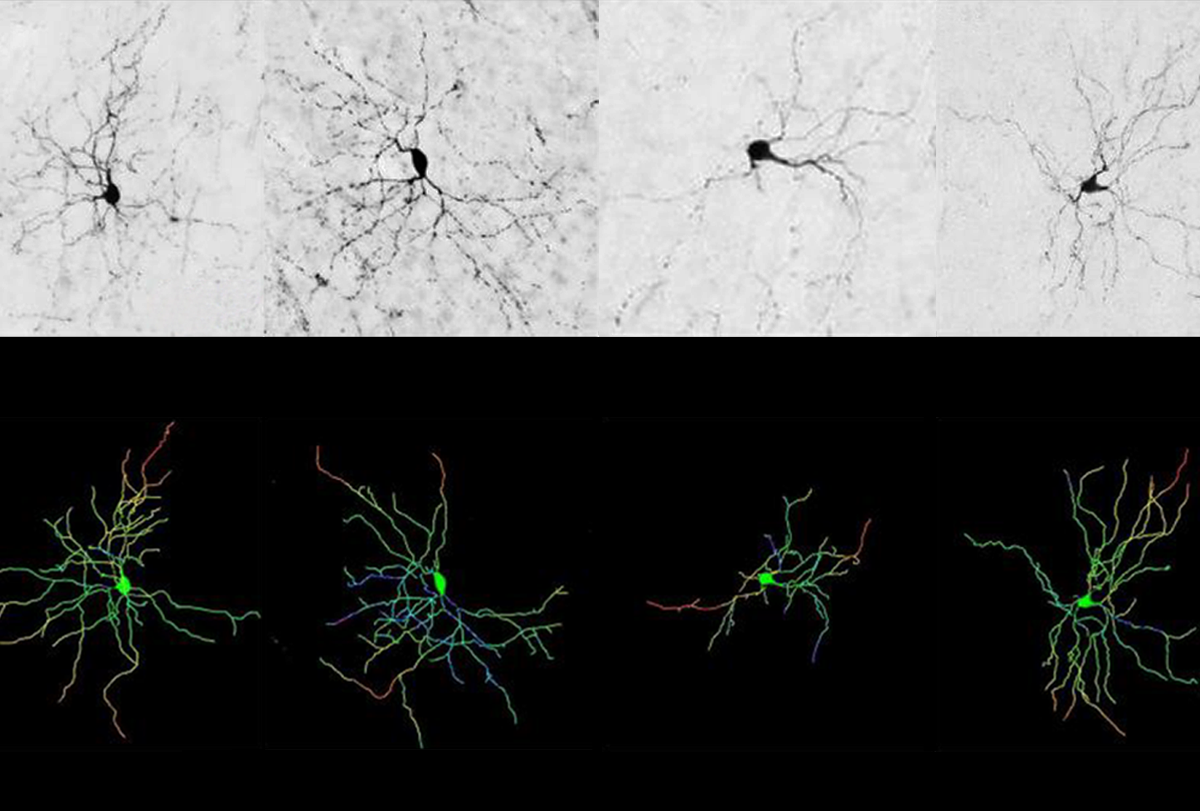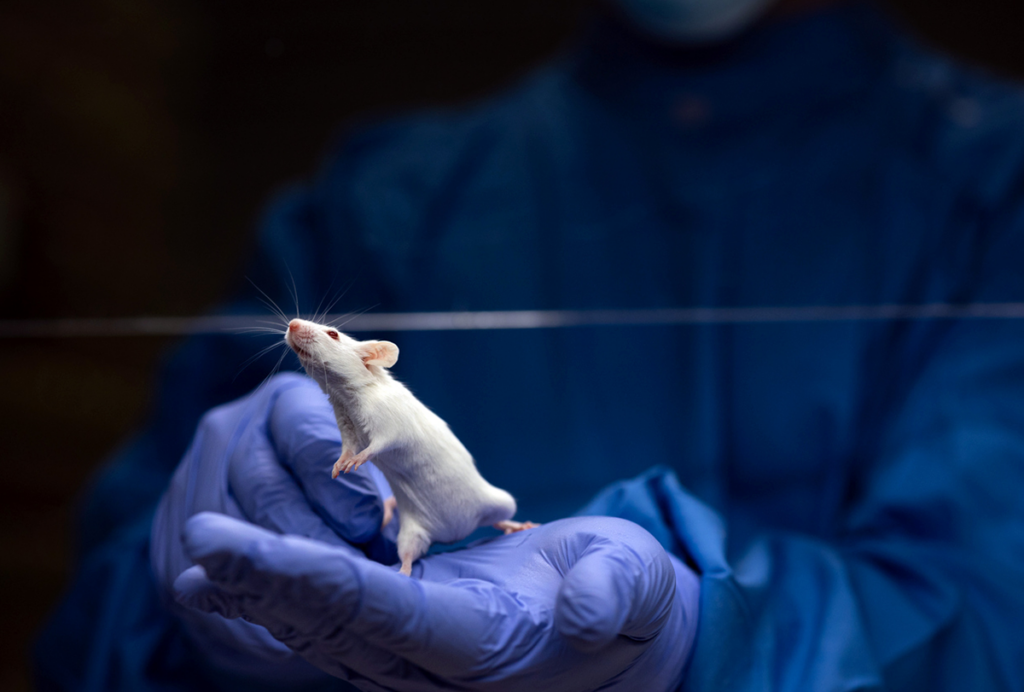FOXP2
Recent articles
Abundant motor proteins disrupt cries in FOXP2 mice
Knocking down the gene that codes for the proteins normalizes the vocalizations.

Abundant motor proteins disrupt cries in FOXP2 mice
Knocking down the gene that codes for the proteins normalizes the vocalizations.
Online library details traits linked to genetic conditions
An expanding collection of websites compiles up-to-date information on the characteristics of people with mutations in genes linked to autism and other conditions.

Online library details traits linked to genetic conditions
An expanding collection of websites compiles up-to-date information on the characteristics of people with mutations in genes linked to autism and other conditions.
Study uncovers link between autism risk gene, language
Mutations in TBR1, a candidate gene for autism, compromise its functions and its ability to bind its partners — including FOXP2. Alan Packer explores the gene’s emerging link to language.

Study uncovers link between autism risk gene, language
Mutations in TBR1, a candidate gene for autism, compromise its functions and its ability to bind its partners — including FOXP2. Alan Packer explores the gene’s emerging link to language.
What the FOX says: Genes that bridge autism, language
To understand the role of FOXP2, a gene that links autism and language, researchers should look at its partner genes and at language models such as songbirds, say Genevieve Konopka and Todd Roberts.

What the FOX says: Genes that bridge autism, language
To understand the role of FOXP2, a gene that links autism and language, researchers should look at its partner genes and at language models such as songbirds, say Genevieve Konopka and Todd Roberts.
Molecular mechanisms: FOXP2 leads to new autism gene
FOXP2, a language gene that is linked to autism, may regulate active connections between neurons by controlling the levels of a protein called SRPX2, according to a study published 22 November in Science.

Molecular mechanisms: FOXP2 leads to new autism gene
FOXP2, a language gene that is linked to autism, may regulate active connections between neurons by controlling the levels of a protein called SRPX2, according to a study published 22 November in Science.
Simon Fisher: Hunting on the FOXP2 trail
Simon Fisher made headlines in 2001 for finding the first gene related to language. He has been following FOXP2 ever since, and has found that it is important in autism and other psychiatric disorders.

Simon Fisher: Hunting on the FOXP2 trail
Simon Fisher made headlines in 2001 for finding the first gene related to language. He has been following FOXP2 ever since, and has found that it is important in autism and other psychiatric disorders.
Network of protein variants suggests new autism genes
Researchers have created a network of various forms of many proteins linked to autism, revealing new molecular interactions that may play a role in the disorder. The unpublished work was presented in a poster last week at the Salk Institute, Fondation IPSEN and Nature Symposium on Biological Complexity in La Jolla, California.

Network of protein variants suggests new autism genes
Researchers have created a network of various forms of many proteins linked to autism, revealing new molecular interactions that may play a role in the disorder. The unpublished work was presented in a poster last week at the Salk Institute, Fondation IPSEN and Nature Symposium on Biological Complexity in La Jolla, California.
Video: Language’s variable role in autism
In a video interview, Simon Fisher discusses what language genes such as FOXP2 can reveal about the nature of autism.

Video: Language’s variable role in autism
In a video interview, Simon Fisher discusses what language genes such as FOXP2 can reveal about the nature of autism.
Genetics: Language gene may regulate autism, schizophrenia
FOXP2, a protein linked to language development that regulates the expression of some autism-associated genes, also dampens expression of DISC1, mutations in which have been linked to both schizophrenia and autism. The results were published 20 March in Human Molecular Genetics.

Genetics: Language gene may regulate autism, schizophrenia
FOXP2, a protein linked to language development that regulates the expression of some autism-associated genes, also dampens expression of DISC1, mutations in which have been linked to both schizophrenia and autism. The results were published 20 March in Human Molecular Genetics.
Scientists link new deficits to FOXP2 mutations in mice
Mice with mutations in a gene tied to language impairment and to autism have trouble learning to associate sounds with motor patterns, says a study published last week in PLoS ONE.

Scientists link new deficits to FOXP2 mutations in mice
Mice with mutations in a gene tied to language impairment and to autism have trouble learning to associate sounds with motor patterns, says a study published last week in PLoS ONE.
Explore more from The Transmitter
Psychedelics research in rodents has a behavior problem
Simple behavioral assays—originally validated as drug-screening tools—fall short in studies that aim to unpack the psychedelic mechanism of action, so some behavioral neuroscientists are developing more nuanced tasks.

Psychedelics research in rodents has a behavior problem
Simple behavioral assays—originally validated as drug-screening tools—fall short in studies that aim to unpack the psychedelic mechanism of action, so some behavioral neuroscientists are developing more nuanced tasks.
New organoid atlas unveils four neurodevelopmental signatures
The comprehensive resource details data on microcephaly, polymicrogyria, epilepsy and intellectual disability from 352 people.

New organoid atlas unveils four neurodevelopmental signatures
The comprehensive resource details data on microcephaly, polymicrogyria, epilepsy and intellectual disability from 352 people.
Can neuroscientists decode memories solely from a map of synaptic connections?
Five experts discuss the progress, possibilities and hurdles of decoding a “nontrivial” memory from an organism just by analyzing its brain connectivity patterns.
Can neuroscientists decode memories solely from a map of synaptic connections?
Five experts discuss the progress, possibilities and hurdles of decoding a “nontrivial” memory from an organism just by analyzing its brain connectivity patterns.